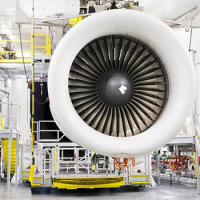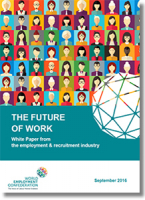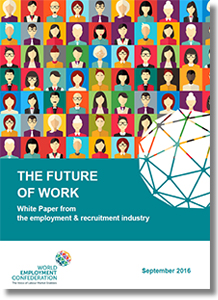The Future of Work
The ‘Future of Work’ white paper discusses major structural shifts that are currently reshaping the world of work such as globalization, diversity, technology, new production patterns and people’s new expectations regarding job and career, the paper provides suggestions on how to tackle these issues and, ultimately, calls upon policymakers to adapt legislation accordingly.
Work & Society: The End of Work As We Knew It
The future of work is a subject as fascinating as it is disquieting.
Work plays a central role in our lives and in our social identity and will continue to do so.
Work not only represents a means to achieve economic independence; it is also a source of personal fulfilment and social inclusion.
Therefore, everyone is very concerned with the structural shifts that are currently reshaping the world of work: technology, demographics, globalisation, new production patterns, the rise of the on-demand economy but also people’s new expectations regarding job and career.
As a matter of fact, the future of work is already here! We are at the heart of a paradigm shift.
Today’s labour markets are undergoing fundamental change: we are facing less a job crisis than a work revolution.
Production methods have changed and attitudes to work have evolved significantly.
Lifelong employment is a thing of the past, 9 to 5 workdays are over, the concept of command and control relationship has become obsolete: individuals want to thrive at work, be on equal terms with their superiors, organise their working time according to their own desires and constraints and negotiate tailor-made working conditions.
For many people, gone are the days of getting a free tertiary education, landing a good job and moving up the corporate ladder at the same company until retirement.
This new reality of work can be pictured by the following patterns:
- A wide variety of employment situations;
- The rise of new forms of work outside the employment relationship;
- Growing individual expectations and diverse working conditions;
- The end of unified workplaces, times and activities;
- The emergence of multifaceted and discontinuous career paths;
- Increasing interconnections between work and private life;
- The end of static and predictable labour markets;
- Fading boundaries between national labour markets.
However, our perception of the labour market is still lagging behind.
Many people believe that the job market is still shaped the way that it was in the 1960s, in the age of industrialisation and mass society: with a predominance of wage-earners and permanent full-time contracts, coupled with command-and-control relationships between workers and employers.
In this model, a permanent and loyal employee enjoys a stable and sustainable professional situation in exchange for his skills and time.
Teamwork, regular hours, advancement based on seniority, secured and negotiated wages; all ensure that employees are treated in exactly the same way. But these days are behind us, welcome to a changing world of work !
What’s Related


Favorites





